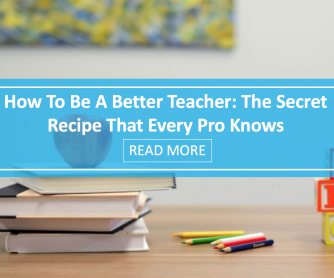Qualities of a good teacher - what are they? This article attempts to look into the practical side of being a good teacher by reviewing the various aspects of a 'successful teacher' strategy that contains both internal and external teaching tools. Happy teaching, and we hope after reading the article you'll be one step closer to becoming the teacher of your learners' dream!
How Can You Be A Good Teacher?
- Voice – Speak in a normal native speed. Do not slow further for understanding when giving key directions. Use of language clarification.
- Attitude – Natural, attentive, exigent, assertive, challenging, energetic, personable, at times uses humor.
- Lesson Preparation – Announce objectives topically/functionally. Have a lesson outline on the board. Lesson should proceed from presentation/checking for understanding to practice to application stages. Summarize lesson at the end. No hesitations. Material selection is appropriate.
- Classroom management – Set time limits. Use pairs. Monitor and modify behavior. Call on students randomly. Switch partners, Create accountability. Hurry students along. Take charge of seating. Efficient switching of partners i.e. student on one end has to move to the other end.
- Materials management – Give directives clearly, efficiently and concretely. Modify text lesson to improve communication and relevance. Use writing as a springboard for production. Use brainstorming as a prelude to presentation.
- Break management – Assign mingling. Check on a few students after the break to create accountability.
- Vocabulary/Grammar Presentation – Present grammar inductively. Pre-teach and brainstorm needed vocabulary. Explain vocabulary through context, paraphrase, gestures etc. Lead students with cues, hints, silent pauses. Challenge students.
- Pacing/Variety –Activities may include pair/writing/review/grammar awareness/info gap/grammar correction /presentation/fluency. Aim for a good variety.
- Student speaking time –60% of class time in pairs is ideal.
- Lesson relevance – lesson is consistently applied to the student’s world.
- Error correction – Correct directly/anonymous indirect teacher correction. Use peer/self correction.
- Student empowerment – Allow the students the opportunity for using language clarification. Students should cooperate and peer correct. Compliment students for desirable SE behaviors.
- Behavior modification – Compliment for correct responses/emphatic behavior modification.
- Props/Visual aids - gestures/handouts/mime/student’s imagination/facial expressions etc.
What About Special Teaching Situations?
A ‘good teacher’ should focus on particular needs:1) Young Learners – It is important to consider how children learn, so classes should be child-initiated, creating a need to learn and then filling it. To get a child involved emotionally and psychologically requires skilled judgment and imagination.
2) Senior Learners – You must pace the lesson according to the students and appreciate that knowledge may not be retained or quickly forgotten. Patience and understanding and sometimes socially therapeutic talents are called into play.
3) Large Classes – This is so challenging as you must cater for individual learning styles, different levels and interests, activate quieter students, delegate responsibilities and manipulate group activities to ensure maximum potential.
4) Limited Resources – This really tests your resourcefulness without the dependence upon technical equipment or supporting materials, as you communicate and interact directly and creatively by generating your own ideas as situations demand.
5) One-to-One – This requires the ability to ‘tailor-make’ lessons based on a preliminary needs analysis and then streamline or modify your course as necessary, whilst performing a variety of roles including participation as a fellow student.
6) Business English – Commerciality necessitates a high level of focus on customer service and personalization of course design and delivery to client needs. Language trainers should desirably bring their own corporate background to class and be able to understand, analyze and produce results in a highly demanding environment, to ensure repeat contracts. Sensitivity, negotiation skills and a genuine interest in business are also important.
8) On-line teaching – this may be the future format for many teachers and you really need to be up-to-date with the latest developments-and creative in composing materials.
Follow this simple formula:
- Be presentable and professional in your approach.
- Always have a lesson plan, but be flexible as required.
- Be enthusiastic, positive, challenging and motivating.
- Create fun and give that added value to ensure economic survival in these recessionary times.
What makes a 'good teacher'? You do.
P.S. If you enjoyed this article, please help spread it by clicking one of those sharing buttons below. And if you are interested in more, you should follow our Facebook page where we share more about creative, non-boring ways to teach English.








